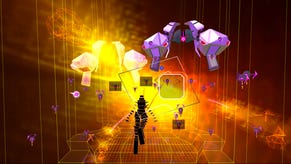'Non-sexual' Rez trance vibrator was my idea - Mizuguchi
Also explains his role on N3.
Tetsuya Mizuguchi has revealed that the Rez trance vibrator was his idea, but that he didn't create it with any particular "sexual meaning" in mind.
Speaking exclusively to our sister-site GamesIndustry.biz during the recent Develop Conference, Mizuguchi also explained his role on Xbox 360 exclusive Ninety-Nine Nights, which he worked on with Korean developer Phantagram.
But let's deal with the USB trance vibrator first. Released alongside the synaesthetic Dreamcast and PS2 shooter, it achieved infamy after a female gamer wrote a rather provocative account of how she and her boyfriend had enjoyed the game together.
Mizuguchi clearly knows about that, too. "That was my idea," he says, grinning, when asked about it. "That was kind of a joke, but a very serious joke. No sexual meaning," he continues. "We always listen to music by ear, and you can watch the visuals moving, the dynamics in Rez, so it's kind of a cross-sensation feeling."
But where's it meant to go when you're playing? "I like to feel the vibration by the foot. So I think it's the feet and the hands. It's a good balance. Some people bite them! I think that's really dangerous, actually..." We're still not sure we believe him.
Mizuguchi also revealed that his role on Phantagram's Ninety-Nine Nights was largely in the conceptual stage.
"My role was the first basic concept - not only the one good guy beats the evil side, but the concept was a vice versa, so you can play both sides, and this is the real war. War is a very difficult thing, it's too real, but I needed to do something to draw the human aspect into my games, but I had no confidence before," he said.
"Finally we had a very high-res, high-definition technology, so I thought maybe we can do it [convincingly]. So I made the first basic concept, and I worked on the basic storyline, and I directed the non-interactive part - the movies - and this is how the collaboration worked with Phantagram."
Mizuguchi doesn't see himself moving wholesale into action-oriented games, though, as he's still devoted to this idea of manipulating "media aesthetics" and music to create "very global" forms of entertainment.
"I want to find challenging new directions, but I feel the same always - what is the base, and what is the human being and the lovely charming point of your game, and worldwide? The human being itself. Games should be very global entertainment, with no border, and no technology limit - a borderless medium."
Elsewhere in the full interview, to be published later this week, Mizuguchi spoke of how he got into games in the first place and the lessons he learned working on early SEGA projects like SEGA Rally, and offered some of his views on next-generation consoles.




